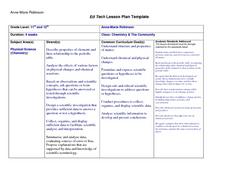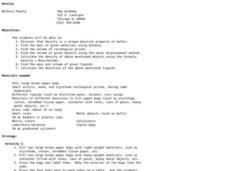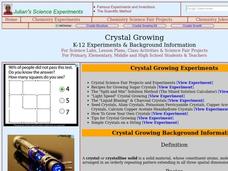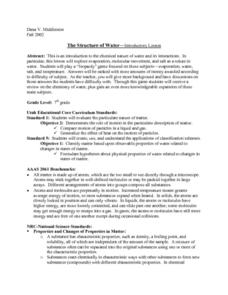Curated OER
Go To The Head of the Cloud
Students pretend they are water droplets traveling through the water cycle. Using their text, they discover the steps in the cycle and the different paths water can take. They write a report about their journey through the water cycle...
Parkway Schools
Phase Changes and Heat
For this phase changes learning exercise, students use the specific heats for different substances to determine how much heat is needed for those substance to change phases. This learning exercise has 9 problems to solve.
Curated OER
Force and Motion - Part 2
Students test different objects such as dominoes, marshmallows, slides, and more to test their force, motion, gravity, friction, and the concept of matter. In this force and motion lesson plan, students understand that the force an...
Curated OER
Ooblek
Students demonstrate the three states of matter. In this matter lesson, students read Bartholomew and the Ooblek. Students create "ooblek" and discuss what state of matter it is.
Curated OER
Matter for Minors
Students use streaming videos, web sites, and hands on activities students to explore matter. They focus on how temperature affects matter and what the particles look like in the states of matter.
Curated OER
Oobleck, Goop, and Glurch
Sixth graders use teacher prepared samples of substances. They perform the same observations and complete charts for each substance. After recording and analyzing their results, 6th graders make changes in the recipes to create a better...
Curated OER
Chemistry & The Community
Students complete a Webquest which investigates the chemistry in items such as shampoo. They research the Internet, perform a lab experiment, and write a scientific lab report with their findings. Upon completion of the activities, the...
Curated OER
Density
Students find the mass, volume, and density of various objects. In this density measurement lesson, students observe how same-sized objects can have different masses, then use water displacement to find the density of each object and...
Curated OER
Hydrologic Cycle Scavenger Hunt
Students explore the water cycle using educational resources. In this water cycle lesson, students use a global climate DVD to complete a scavenger hunt on the hydrologic (water) cycle.
Curated OER
Density And Volume
Sixth graders explore the concept of density as a relationship of an object's mass to its volume. Densities of a variety of objects are compared and used to identify an unknown object.
Curated OER
Crystal Growing
Students explore the different phases of a crystal. In this mineral lesson students grow their own sugar crystals using a sugar recipe.
Curated OER
Sink or Float?
Students make and test predictions about sinking and floating, and classify objects according to whether they sink or float.
Curated OER
Sink or Float?
Students will determine whether various objects sink or float in water. They do not need to explain why objects sink or float. They are rather to be encouraged to observe that the same objects will sink or float every time, i.e., that...
Curated OER
Reaction Reasoning
Third graders experiment with chemical reactions and examine what happens to the atoms when different reactions occur. In this matter lesson students divide into groups and complete a lab experiment.
Curated OER
Elements Commercials
Student teams use a digital camcorder and iMovie to create a commercial about an element. They also use the Internet and their textbook to gather the following information about their element: the name, the symbol, the atomic number, the...
Curated OER
Water Pressure Blaster
Third graders complete an experiment to introduce them to the concept of water pressure. In this water pressure lesson plan, 3rd graders create pressure in a water bottle and observe the force of water that is created.
Curated OER
The Nature of Salt
High schoolers record information from the periodic table for sodium and chloride. They determine whether salts are molecular or ionic compounds, along with sodium chloride's molecular weight, and relative weights
Curated OER
Exploring the Water Cycle
The water cycle is one of earth's most easily observable processes, but demonstrating each step within classroom walls can be a challenge. Through a series of videos and quick demonstrations, cover each aspect of the hydrologic cycle in...
LABScI
Freezing Point Depression: Why Don’t Oceans Freeze?
Can you go ice fishing in the ocean? Learners examine the freezing point of different saltwater solutions. Each solution has a different concentration of salt. By comparing the freezing points graphically, they make conclusions...
Curated OER
Float or Sink?
Students examine why some objects float while others do not. They place various objects in water to observe their floating capability. Students record the object, its weight, and if the object floated. They construct a graph plotting...
Curated OER
Earth Science: The Structure of the Earth
Young scholars identify and complete activities about the structure of the Earth. In this Earth structure lesson, students view a Powerpoint about the Earth's layers and complete a diagram. young scholars compare temperatures in the...
Curated OER
The Chemical Nature of Water
Seventh graders simulate a Jeopardy game to examine the chemical nature of water. Among the topics featured are evaporation, water, salt, and temperature. finally, as review, 7th graders answer a battery of questions presented by the...
Curated OER
Separating Soup Mix
Students use screens of three sizes to separate a mixture of five solid materials. They plan and conduct simple investigations using appropriate tools, measures, and safety rules and record and report observations, explanations, and...
Curated OER
Solids and Water
Students investigate mixtures made of water and familiar solid materials. They observe and discuss the changes that occur immediately and set the mixtures aside for a day. Finally, students observe the mixtures, note changes, and graph...

























